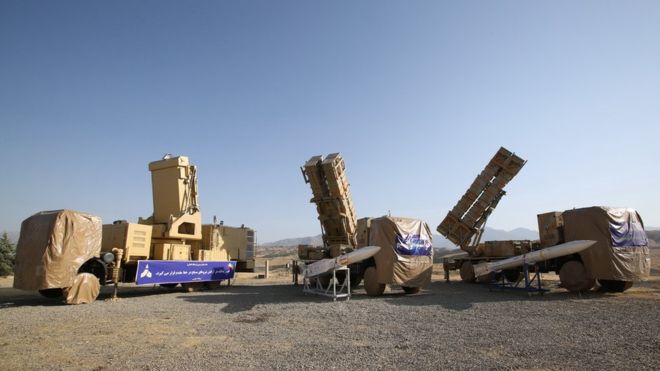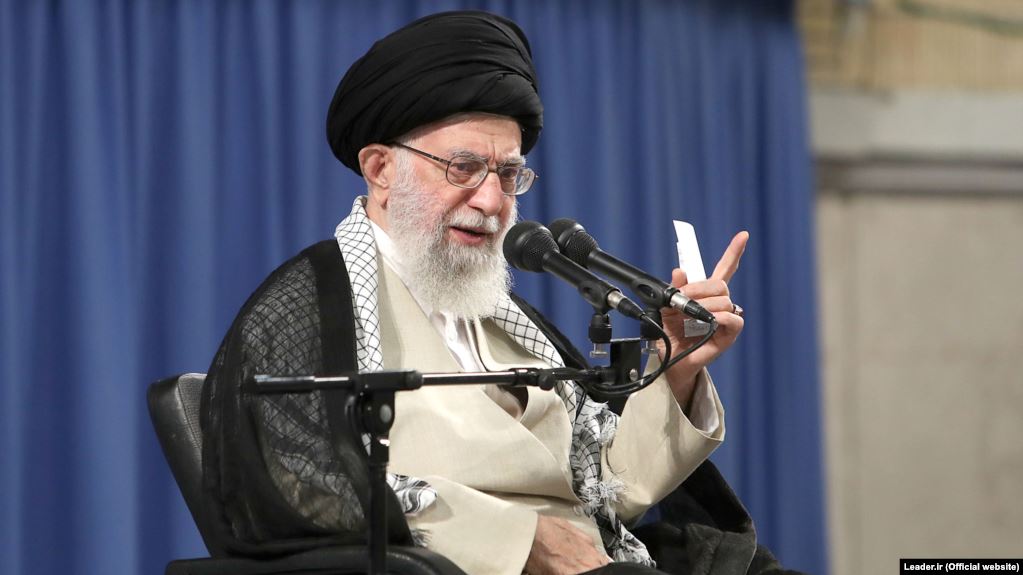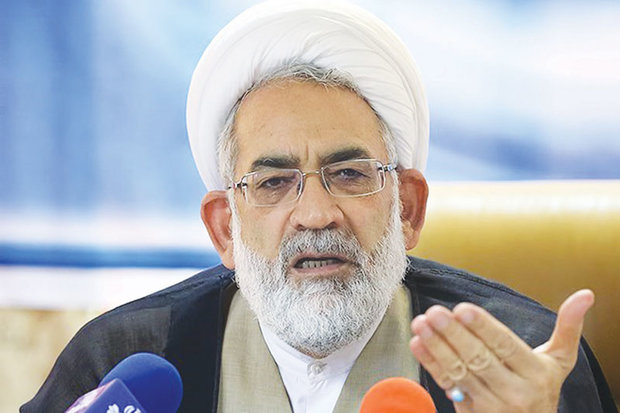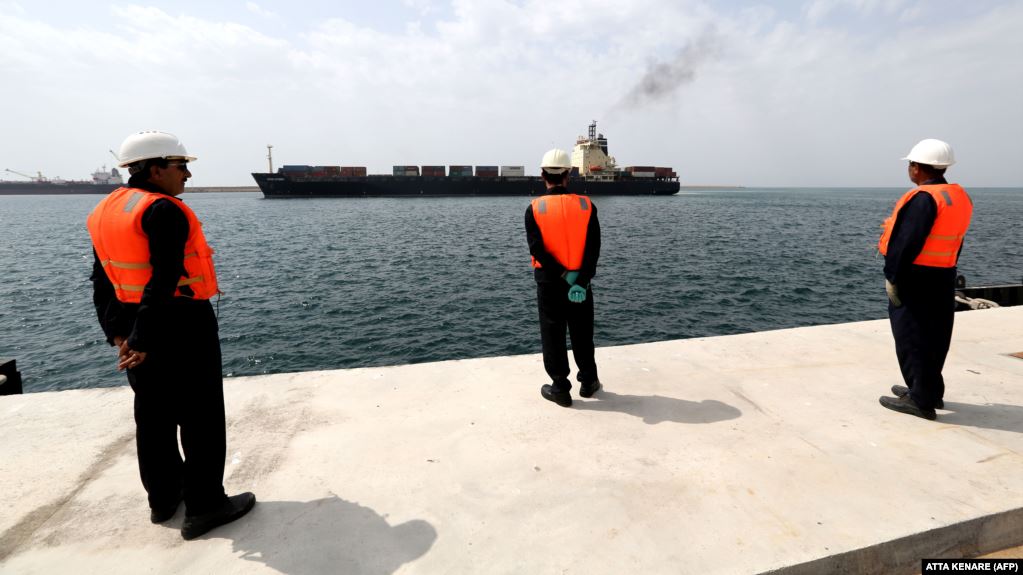
America has nothing to do with the legal issues
The editorial of Iran Emrooz addresses the issue of the new U.S. sanctions on the Iranian Supreme Leader and Foreign Minister, asserting that there is not much Iran can do about them.
Iran has designated America as “the enemy” since the beginning of the Revolution and doesn’t want to have any interaction with this transregional big power; as a result, the Iran-America relationship is of a special nature.
They have had negotiations and used peaceful methods in different matters, but Iran has never sought decisive interactions with America over global issues. As for the JCPOA, Iran is legally right, and America has violated its obligations in the nuclear deal. However, America’s political and military power, its position in the UN Security Council, and its economic and financial abilities make it possible for this country to exert its will and move its agenda forward.
Iran too has used all its power to politically isolate America and to put pressure on it. Nevertheless, since America is much stronger, it can enforce its plans, while Iran cannot. America has put Iran’s economy under pressure with all its power, and its recent symbolic moves — putting sanctions on Iran’s Supreme Leader and Iran’s Foreign Minister — wouldn’t particularly increase the pressure.
When Iran cannot sell its oil and benefit from the global economy, as well a being under U.S. pressure, adding two symbolic sanctions to the sanction’s list wouldn’t do much. America is forcing the countries, as well as individuals and legal entities, to choose between Iran’s market and the U.S. market.
However, as for Iran’s response, it cannot do much more than it has done so far. Other than diplomatic and political measures, Iran cannot do anything else. On paper, it can legally put sanctions on America, but to no avail.
America has nothing to do with the legal issues, and when it imposes sanctions on Iran’s Foreign Minister, it will create restrictions on his activities.
Arman Emrooz – June 26
Fear of globalization
Majid Reza Hariri, Deputy to the Iran-China Chamber of Commerce, argues in Jahan Sanat’s editorial that to overcome the decrease in foreign trade, Iran has to turn towards globalization.
Two fundamental issues have played a significant role in the decrease in Iran’s foreign trade: the U.S. sanctions and its unwillingness to globalize. The toughening of the U.S. sanctions on Iran’s trade cannot be easily ignored, as these pressures are the main issue in foreign trade and must be resolved.
Under the current circumstances of the “economic war”, Iran cannot have any plans for action, because the other side has the initiative and Iran just has to react. Amidst Iran’s neighbors, the best market belongs to the Gulf countries, and given the political relationship, they are not willing to cooperate with Iran.
The most fundamental problem in Iran’s foreign trade, however, is the unwillingness of Iran’s businesses to become global and to increase the country’s trade indexes. Given the performance of politicians and businessmen, it seems as if they are afraid of being active in the World Trade Organization (WTO); while if those in charge of trade are after transparency, they must join this global community and act in accordance with its standards.
Joining the Eurasian Economic Union can be helpful, at a time when Iran is engaged in an economic war. The economy of these countries is pretty much like Iran, in the sense that they receive goods for selling raw materials. A presence in bilateral and multilateral treaties can be a good exercise for Iran’s economy since Iran was expected to have joined this union much earlier.
As mentioned above, Iran’s economy cannot plan to prosper in foreign trade. As a result, the best way is for it to react logically to the actions of the other side.
Jahan Sanat – June 25
The dispute between Rouhani and Jahangiri
The editorial of Setareh Sobh deals with the recent dispute between the Iranian President and his first Vice President, seeing it as representative of how the reformists are treated by Hassan Rouhani.
In the dispute between the Iranian President and his first Vice President, Rouhani told the person who got him elected as president: “You and the reformists are after overthrowing the government!” The First Vice President Eshaq Jahangiri had a significant role in the reelection of Rouhani for his second term of presidency.
Jahangiri’s role in Rouhani’s first and second governments has been undeniable. In 2017, he took part in presidential debates, changing the balance to Rouhani’s advantage that led to his victory.
The day after the election of the 12th government, the understanding was that the President didn’t need Jahangiri any longer and was using Mahmoud Vaezi – a principlist. The 12th government is in actuality run by Vaezi, Nobakht, and Rouhani, as the President entrusted the responsibilities of Jahangiri to Vaezi and Nobakht.
Even though Rouhani kept up the appearance, injustice to Jahangiri went too far, to the extent that he said he couldn’t even change his own secretary. Rouhani has an instrumental view of the reformist movement. He used the reformists’ influence to win the election, but the day after the victory, his remarks and meetings showed that he was interested in other political currents in Iran.
Today, the question is this: are the reformists — who played a role in Rouhani’s victory — present in his cabinet? People like Zanganeh and Hojati are among the few reformist ministers in the government. Meanwhile, mistreating Jahangiri is not right, and this is indicative of how the reformist movement is treated.
Setareh Sobh – June 24
Russians’ performance in the JCPOA
The editorial of Aftab Yazd focuses on Russia with regard to the nuclear deal (JCPOA) and how it has used Iran’s card to gain concessions from other countries.
While many believe that the Europeans have not abided by their obligations in the JCPOA after Trump pulled out of the nuclear deal, the question is: has Russia fulfilled its obligations meanwhile?
Even though Iranian politicians only blame the Europeans for not fulfilling their promises or being slow in this regard, it shouldn’t be forgotten that the Russians, too, have had a very poor performance in this regard. In spite of the fact that they keep reiterating, they are always standing by Iran.
Russia’s political behaviors and actions have followed a particular method since the time of the Tsars which is based on saying one thing and acting differently. What justifies this duality is the interest of oligarchic groups ruling in Kremlin.
Russia in its foreign policy follows the interests of these groups. Russia’s interests require calling Iran a strategic partner to gain concessions from it. On the other hand, Russia uses Iran’s card to gain concessions from regional and international rivals.
Currently, the deputy to Russia’s Foreign Minister says that because of the current tensions in the Gulf, Iran needs Russian S-400 missiles and must buy them. In the meantime, even S-300 missiles are located – in Iran or Syria – only under certain conditions. The Bushehr nuclear power plant, which was supposed to be ready 20 years ago, has not been completed yet. It can be said, therefore, that what Russia is doing in the JCPOA is not any different.
Consequently, it can be said that the Russians, within their own interests, seek to keep Iran under its own influence; at the same time, they try to gain their own transregional concessions through getting along with certain other countries.
Aftab Yazd – June 23

U.S. cyberattack against Iran

According to the U.S. media, the United States launched a cyber attack on Iran’s military computer systems, hours after Iran downed a U.S. drone. The cyber attack specifically targeted the IRGC computers, crippling those that control missile and rocket launchers.
A U.S. official said that after Trump had aborted military action in response to the downing of a U.S. drone, the U.S. Army Cyber Forces conducted the cyber attack against Iranian military computer systems.
U.S. officials urged that this attack crippled the launchers that control Iranian missiles and rockets. They added that the cyber attack specially targeted IRGC computer systems. The cyber attack was planned weeks ago and was supposed to be a response to the attack against oil tankers that took place in the Gulf of Oman.
Mohammad Javad Azari Jahromi, Iran’s Minister for Information and Communications Technology, said that the United States was not successful in its cyber attacks on Iran’s military.
Mohammad Javad Azari Jahromi denied those reports, saying on Twitter “they tried very hard, but failed to carry out a successful attack.”
He also pointed out that Iran neutralized 33 million attacks with its national firewall last year.
Meanwhile, the United States says that Iran’s cyber attacks against the U.S. have increased. Christopher Krebs, director of the U.S. Cybersecurity and Infrastructure Security Agency, has said that “Iranian regime and its agents” have hit the U.S. administration’s industries and centers with “destructive cyber attacks.”
Iranian hackers have reportedly targeted U.S. agencies and economic sectors including oil and gas.
BBC
Kayhan London
Khamenei: the Americans are scared, so they want to negotiate!

Iran`s Supreme Leader Ali Khamenei said the U.S. suggestion for negotiations is a “deceit.” He made the comments the day after the U.S. administration imposed sanctions on him and the Iranian Foreign Minister Mohammad Javad Zarif.
In a meeting with judicial authorities, Khamenei repeated his rhetoric of hostility with American, pointing out that Americans are scared to move forward due to the “power of the Iranian nation”, so they want to deprive them of this power by negotiations.
Even though the Iranian people are suffering from economic pressures, Ali Khamenei holds that “the enemy” has not achieved its goal through pressure, which is why they are suggesting negotiations.
“Then if you accept their words in negotiations, the nation would be devastated,” he stated, “and if you don’t, the very same pressures, propaganda, and creation of political atmospheres continue.”
Khamenei called US sanctions on Iran “cruel”, adding despite the fact that such measures have oppressed people; they are still “powerful.”
This was Khamenei’s first reaction to the latest U.S. sanctions that targeted his office. The U.S. President Donald Trump issued an executive order on Monday, imposing sanctions on Khamenei, his office and those closely affiliated with him.
Analysts believe that including the Supreme Leader and his office in the sanction list is a direct strike against Ali Khamenei. He must be held responsible for the failure of attempts to mediate between Iran and America, particularly when the Japanese Prime Minister Shinzo Abe volunteered to do so. His strategy has failed to lead Iran out of the current crisis.
Radio Farda
A ‘ring of infiltrators’ in Iran’s Ministry of Petroleum arrested

Security institutions have recently identified and arrested a “ring of infiltrators” in Iran’s Ministry of Petroleum, said lawmaker Hossein Ali Haji Deligani.
He added this group was headed by a “woman who built up relationships with 16 senior officials in the ministry,” hence causing damages to the country during the current economic war.
By influencing 16 influential personnel of the Ministry of Petroleum, this woman could keep some of the Ministry’s important decisions in suspension, remarked Haji Deligani in an interview with the Fars News Agency. She could also make those officials take poor decisions in the interests of the enemy and against the country’s national interests, he added.
The Ministry of Petroleum has become Iran’s Achilles heel, since its economy is dependent on oil, pointed out Haji Deligani. “Therefore, America tries to inflict damages on our country through infiltrating into this Ministry and disrupt its performance.”
In the meantime, Iran’s Prosecutor-General Mohammad Jafar Montazeri announced the case is under investigation at present while refusing to elaborate on it, saying it is not to the “expediency” of the country.
“A crime has been committed,” said Montazeri, “and the intelligence, security and judicial bodies are investigating it.” These investigations need to be completed before we publish anything in this regard, he asserted.
Mehr News Agency
Eghtesad News
A significant drop in Iran-Europe trade

The latest annual report of the European Commission shows a significant drop in bilateral trade of the 28 members of the European Union with Iran during the first four months of 2019.
While these statistics are released, Iran has given a 60-day deadline to provide for its economic interests in the nuclear deal. Iran has specifically asked Europe to launch the financial mechanism with Iran, INSTEX. With almost 2 weeks remaining to the deadline, Iran says it will not extend the deadline.
The new European Commission’s report shows that in the first four months, Iran has had 260 million euros worth of trade with the European Union, while the number for the same period last year was 3.79 billion euros.
The main part of Iran’s exports to Europe was crude oil, but European companies have stopped buying Iran’s oil due to the U.S. sanctions.
Europe’s exports to Iran have dropped from 2.6 billion euros to 1.12 billion euros. Details of the report show that Iran’s trade with its main European partners has severely dropped.
Iran’s share in Europe’s foreign trade is less than 0.5%. Other trade partners of Iran are in the same position as Europe.
New Chinese statistics, Iran’s biggest trade partner, show that in the first five months of this year, Iran’s exports to China had a 46.6% drop, reaching 7.167 billion dollars. China’s exports to Iran reached 3.737 billion dollars, showing a 26% drop.
Meanwhile, ordinary people in Iran are being crushed under the U.S. sanctions. With the U.S. pulling out of the nuclear deal, a new round of sanctions against Iran started, and more sanctions against Tehran are on the way, making living difficult not merely in Iran’s capital, but in many places in the country.
Radio Farda
